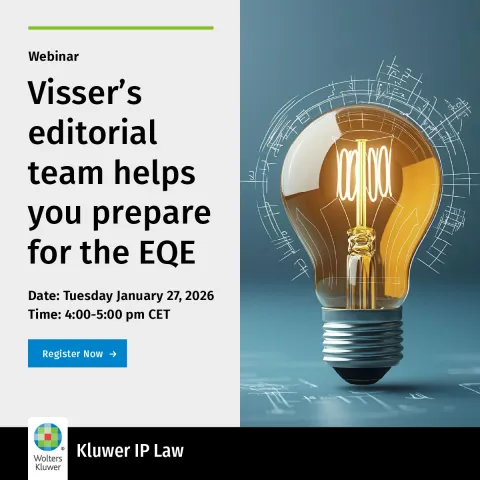A rough deal for the patentee: notes from the user consultation conference on the second draft Rules of Procedure of the Boards of Appeal
December 6, 2018
by Adam Lacy and Thorsten Bausch
As European patent professionals are all too aware, the Boards of Appeal of the EPO (BOA) have a huge amount of power, particularly over the rights of patentees. In EPO opposition proceedings, the BOA have the final say on whether to revoke a patent across all of the EPC contracting states. This does not apply to parties opposing European patents at the EPO, who live to fight another day in the form of national invalidity proceedings if they fail to persuade the BOA to revoke a patent.
In this light, it is with some concern that we attended the User consultation conference on the Rules of Procedure of the Boards of Appeal (RPBA) held by the EPO in Munich yesterday, where the latest draft RPBA was up for discussion.
The conference was opened by Roland Grossenbacher on behalf of the Boards of Appeal Committee (BOAC) and Carl Josefsson, President of the BOA. Justice Colin Birss did a brilliant job to moderate the conference and manage the sometimes critical contributions from the audience, not shying away from sharing his own experiences as a UK judge and former barrister with the audience. Marcus Müller gave an excellent presentation on case management aspects under the new RPBA, before it was Mike Harrison’s turn to explain the procedural hardships provided in the new rules to an audience that was not always amused by them. He recognised that he had drawn the short straw with this assignment and valiantly defended the current draft.
It seems to us that the main purpose of the new RPBA is to make proceedings more efficient and thus help the BOA clear their significant backlog. We are sceptical though whether the new RPBA will actually achieve this aim and we are concerned that the main legacy of this draft will likely be that the EPO system will be skewed even more in the favour of opponents, contrary to the principle of “equally fair treatment” for parties to the appeal set out in G 9/91. Thus, while we welcome many of the new rules of procedure and stand behind their general principles and ideas, we would like to consider a few Articles in more detail in the following where we have concerns from a patentee’s perspective.
Article 12(7)
New Article 12(7) is a first example of a rule change which will make life more difficult for patentees.
Periods specified by the Board may exceptionally be extended at the Board’s discretion upon receipt of a written and reasoned request, presented before the expiry of such period. The period referred to in paragraph 1(c) may not be extended.
The highlighted sentence is new and removes the discretion that the BOA presently has for extending the response to the grounds of appeal. In our view, the removal of this discretion is not only of little value in making BOA proceedings more efficient, but also systematically favours opponents over patentees.
This is particularly so if a patent is opposed by a large number of opponents, all of whom appeal the decision maintaining the patent. The patentee will then have only four months to respond to a large number of different appeal cases, but under the proposed rule, the Board will have no discretion to extend the period for response for the patentee. This will unfairly disadvantage the proprietor.
When confronted with these objections at the User Conference by Heike Vogesang-Wencke on behalf of epi and by this blogger, the panel consisting of eminent members of the RPBA drafting committee and the BOAC took note and did at least not vigorously defend the current hard deadline of four months. Both Heike and I submitted the proposal that if there are three or more appellants, the respondent should be allowed a term of 6 months for the reply as of right. This would have the advantage of being fairer to patentee as well as transparent and easy to apply. We took some cautious comfort from the fact that the President of the BOA, Carl Josefsson, in his closing statement mentioned this point again as one he had taken note of, together with emphasizing the need of the RPBA to be balanced between opponents and patentees. Let us hope that at least this hardship for patentees in multi-opponent proceedings will be mitigated in the final version.
Article 13(1)
Any amendment to a party's appeal case after it has filed its grounds of appeal or reply is subject to the party's justification for its amendment and may be admitted only at the discretion of the Board.Article 12, paragraphs 4 to 6, shall apply mutatis mutandis.
The party shall provide reasons for submitting the amendment at this stage of the appeal proceedings.
The Board shall exercise its discretion in view of, inter alia, the current state of the proceedings, the suitability of the amendment to resolve the issues which were admissibly raised by the other party or parties in the appeal proceedings or which were raised by the Board, whether the amendment is detrimental to procedural economy, and, in the case of an amendment to a patent application or patent, whether the party has demonstrated that any such amendment, prima facie, overcomes the issues raised by the other party or parties in the appeal proceedings or raised by the Board and does not give rise to new objections.
Article 13(1) regulates the rights of parties to make amendments to their case after the grounds of appeal and reply thereto has been filed. The amended article places more burden on patentees and opponents alike to explain in more detail the reasons for the amendment to their cases. It is not clear how this focus will increase the efficiency of the proceedings, as it seems to us to be more likely to lead to longer submissions at this point in proceedings justifying any new aspect of the case, with accompanying debates in oral proceedings and reasoning in the BOA’s final decisions about whether such amendments are justified.
Furthermore, the underlined sentence puts an extra, and pretty unsettling, burden on the proprietor that is not reflected in the requirements for the opponent. This new requirement may put the applicant or proprietor in the rather difficult position of having to prove a negative, i.e. that the amended claim does not give rise to new objections. The question is whether this means that the patentee is supposed to identify and then refute any conceivable objection(s) against amendments to the patent application or patent, even if those have not been raised or foreshadowed by the EPO or the opponents.
When discussing this point at the User Conference, the panel seemed to us to be at pains to emphasise that this amendment does not go as far and requires little more than a substantiation of the new requests in the form of a short explanation as to why, e.g. an amendment based on the description does not expand the scope of protection or introduce a lack of clarity. While we would prefer to see the highlighted sentence removed from Article 13(1), we are not very optimistic that this will happen and can only hope that case law will develop in line with panel’s generous interpretation.
Article 13(2)
Any amendment to a party’s appeal case made after the expiry of a period specified by the Board in a communication under Rule 100, paragraph 2, EPC or, where such a communication is not issued, after notification of a summons to oral proceedings shall, in principle, not be taken into account unless there are exceptional circumstances, which need to be justified with cogent reasons by the party concerned.
In our view, this article may also result in unfair treatment of the parties. For example, consider proceedings where an opponent raises ten different added matter objections against a patent. Judging several of the objections to be weak and in order not to burden the opposition division too much and to comply with the requirement of the case law to file “convergent” auxiliary requests (see T 565/07), the proprietor limits their requests to those dealing with the strongest objections, and relies on argument alone for the weaker objections. The opposition division confirms conformity with Art 123(2) EPC in its preliminary opinion and maintains the patent as granted. Opponent appeals. To Patentee’s surprise, the Board indicates in the communication ahead of the oral proceedings that one of the “weak” objections actually has merit. Even if an amendment exists which easily overcomes this objection without raising any issues, according to the amended paragraph the proprietor will only be able to file it in “exceptional circumstances” which are justified with “cogent reasons”. It is doubtful from the rules and the explanatory remarks whether the original filing of a large number of objections by an opponent, which were not considered relevant by the opposition division, would be deemed to be such an “exceptional circumstance”.
This problem only disadvantages the patentee, as there is no limit on the number of arguments and objections an opponent can file and the patentee may have acted entirely in good faith and in line with the principle of procedural economy by not filing a disproportionate number of auxiliary request in the first instance. They also had no particular reason to do so in view of the positive preliminary opinion and decision by the Opposition Division. Are patentees allowed to rely on such preliminary opinions/decisions? Being threatened by the “very high burden” (Mike Harrison) of having to justify “exceptional circumstances” by “cogent reasons”, it seems likely that proprietors will respond to this simply by filing more requests in the first instance, to make sure that all possible permutations of objections are dealt with by amendment. This particular rule may therefore fail to increase procedural efficiency.
When the panel was questioned on this point in the User Conference, there did not seem to be unanimous agreement on how the convergence requirement from the case law should be applied in cases of multiple objections. The take home message for us was that the best approach for patentees in this situation is simply to file multiple requests already in the first instance dealing with all arguable objections raised.
Conclusion
The objectives of the RPBA drafting committee to provide rules that enhance procedural efficiency, transparency, predictability and greater harmonization between the individual boards are certainly commendable. The question is, though, whether the above amendments to the RPBA will help to achieve these goals. Some attendees to the User Consultation conference expressed doubts in this regard, based on the verifiable fact that the last round of RPBA amendments did also not significantly contribute to more procedural efficiency. Time will tell whether and to what extent the new rules will actually contribute to more procedural efficiency. In our personal view, there is a limit to what procedural law can contribute to shorten the duration of appeal proceedings, without compromising the parties’ right to be heard. The BOAs’ ongoing recruitment efforts, which are supposed to be continued also in 2019 and 2020, are certainly much more valuable in this regard. Despite the considerable backlog of 9200 cases, there is finally light at the end of the tunnel!
The message in all of this for users of the EPO is clear: frontload cases before the EPO in particular by filing requests dealing with all objections before the opposition division, and don’t forget to review your appeal cases before these rules enter into force. As Nobel Laureate Bob Dylan put it,
you better start swimmin', or you'll sink like a stone, for the times they are a-changin'.
You may also like















Peter Parker
Thanks for bringing this up again. I do not even understand the principle behind some of the planed changes. How can taking discretion from the Board in matters like time extensions make proceedings more efficient? If the BoA does not want to grant an extension, it will not grant it. If the BoA thinks it is expedient to give an extension, it will do so. Does the EPO have so little trust in the judgement of the BoAs that it feels that it needs to hold their hands all the time? Also, more general, the drive towards more efficiency is also getting dangerously close to the fundamental principles of fairness, adequacy and the right to be heard. Even if not mentioned in the EPC, the EPO should be careful not to overstep limits set by constitutions and human rights!
Concerned observer
The natural response of patentees to the proposed changes will be to file more Auxiliary Requests, in order that there are sufficient Requests on file at 1st instance to address every possible (win/lose) permutation for all of the objections raised by the opponents, irrespective of the apparent strength of each of those objections. Even with only a small number of objections under each heading, this could give rise to an alarming number of permutations, especially if any of those objections can be addressed in a number of different ways. Whilst this would be an understandable response on the part of patentees, it will place an increasingly impossible (and expensive) burden on opponents, especially if - as is entirely predictable - it results in huge numbers of ARs being filed at the stage of final written submissions (ie after the patentee is in receipt of the OD's preliminary opinion). It will also make it increasingly difficult for oral proceedings to be completed in the allotted time frame without depriving parties the opportunity of a fair hearing with regard to each ground of objection for each admissible request. It therefore stands to reason that there is absolutely no point limiting the patentee's ability to amend his case at the appeal stage unless and until there is robust case management at 1st instance. The Boards of Appeal may well be independent but that does not mean that they should be free to introduce rules that, by turning a blind eye to structural defects in the 1st instance procedure, systematically deprive parties of their right to be heard.
MaxDrei
As to the sure fire prediction of an obscene proliferation of Auxiliary Requests, early on in the opposition proceedings, one recalls that the more than likely consequence of an unimaginative amendment of the Rules intended to improve speed and efficiency is to render the proceedings more complex, lengthy and inefficient. Recall, for example, the misconceived and misbegotten rule changes to cap the length of time in which the filing of a divisional is permitted, the resulting ridicule and abuse, and the swift setting aside of those rule changes. The Law of Unintended Consequences is all-pervasive. I suppose an EPO fee to be paid on each and every Auxiliary Request (or after the first fifteen Requests) would require an Intergovernmental Conference to implement. But it might curb the worst excesses of AR proliferation. Consider how Americans, otherwise willing to stump up large amounts of money, baulk at giving the EPO any claims fees at all. Sometimes, it is best to approach public policy objectives obliquely rather than explicitly. By a nudge rather than a prohibition. Bloggers, one more thing to think about, when whingeing that these new Rules are anti-patentee. Might this not be the "hidden agenda" behind the rule changes? We live in times where a lot of influential people see each and every patent as an unwanted restraint of trade, so that the sheer numbers of issued patents has to cropped down to a minimum, regardless what inventors have against that public policy objective. Get rid of all "trivial" patents at all costs, they demand. Uphold only those where the contribution to the art is, from the outset, the application as filed on the priority date, self-evident, substantial and clear. If so, those pushing for implementation of the rule changes will be delighted with this assessment by members of the Hoffmann Eitle firm.
Surprises
I thought Roland Grossenbacher had at long last retired, and am therefore to see him donning a new hat.
Attentive Observer
Dear Max Drei, No need for a diplomatic conference in order to introduce a fee in case of an inordinate number of auxiliary requests. Auxiliary requests are nowhere to be found in the EPC, and it may require a mere amendment to the Implementing relations, to be decided by the AC. The AC managed to amend R 27-28, whereby this amendment was in blatant contradiction with the EPC, as has been recently shown in T 1063/18. And the amendment was not even in response to a decision of the EUCJ, but on a mere notice of the commission. When there is a will, there is way! Have we not heard this quite often recently? See below. Dear Concerned Observer, Life will not only be made more difficult for the opponent, but also for the patentee. That during the conference representatives acting for patentees were a bit more vocal, does not mean that representatives acting for opponents were silent. I fear that in the end, no party filing or haggling with patents, will be gaining anything, at the exception of another instance which some circles want to push down our throats, whether we like it or not. See below. Can the NRPBA improve the overall efficiency of the EPO? Taken as such, it is very clear that the NRPBA have the aim to increase the efficiency of the BoA, but it is highly doubtful that the overall procedure at the EPO will see an increase in efficiency. What does it help to increase the efficiency at one end, but to lower it at the other? That the procedural liberties available in some member states of the EPC cannot be generalised is one thing, but it seems that here, like often at the EPO, the pendulum is swerving from one side to the other, and forgetting not the golden standard, but the golden middle. Some further ideas For a long time, I refused to think that the EPO will eventually be reduced to a mere machine churning out patents by the dozen, in fact caring little about their quality, but still claiming the quality could not be higher and has steadily improved between 2010 and 2018. However when looking at some of the comments in the explanatory remarks of the amendments thought, the reference to the UPC in those is conspicuous to say the least. With the perspective of the UPC, certain circles, also represented at the conference, will actually welcome if less and less weight is given to the EPO and its Boards. Let’s grant the patents, if subsequently there is a problem, the UPC will correct it, and everything will be honky dory. The more life is made difficult at the EPO, the less should be done there, and wait for our beloved UPC, which is so wonderful for European Industry and its SMEs….. Once the patent is granted, and this is nowadays done pretty quickly at the EPO, go straight to the UPC, why bother with an institution like the EPO? UPC is the future! This would also have the advantage that, we, wonderful lawyers, will be able to help you tremendously. That at the same time, our pockets will fill up even faster than before is a side effect which we have never thought of….. It is also clear that UK should remain in the UPC loop in spite of Brexit, as after all, we British lawyers, contributed to it quite heavily, and we do not want our hopes of good business to be lowered by such minor details. Let’s just fiddle with the UPCA, use Art 87 UPCA, even if it does not fit, to continue our little or big business. I do not believe in conspiracies, but sometimes it is difficult to get the idea out one’s head. Reading what a certain British lawyer, now not any longer relying on rumours as before the House of Lords, has uttered in a recent edition of Juve is flabbergasting, and necessarily brings about such ideas. https://www.juve-patent.com/news-and-stories/legal-commentary/im-a-pragmatist-there-will-be-a-upc-agreement/ Techrights: FINGERS OFF!!! Directly or indirectly